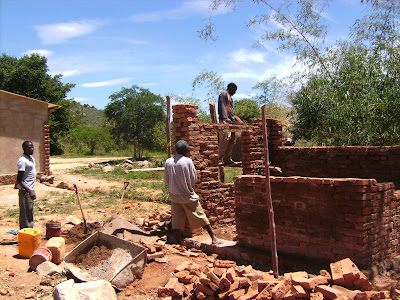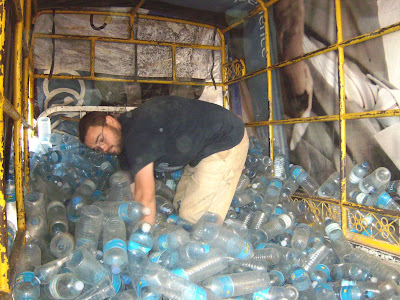Summer 2009 Work Team:
Besides myself, our work team for this summer includes five people:
Jessica Cagley is interning with Project Kesho this summer. Jessica is a grad student at the Evans School of Public Affairs. She is working on an evaluation of our previous work . She has been and will continue to spend a lot of time in the schools with the teachers and students. She has been organizing meetings with village leaders and community groups. She plans on conducting numerous teacher and student interviews as well as household interviews and focus-group type discussions this summer. The information she will gather will allow us to more accurately plan our future programs. Jessica's husband,
Casey, was in Tanzania for about three weeks and just left. Casey works in the music industry and brought about 60 recorders (the flute-like instrument) with him. Casey taught the 5th grades at the Ulonge Primary School for a week and then the students were able to take them home with instructional books.
Abbas Sanga has been working for Project Kesho all year and he will be working again this summer. His work has been invaluable for us and continues to be so. For this summer we hired a female translator,
Deborah, to work with us. She will mainly be working with Jessica so that Jessica can conduct female only discussion groups. Having two translators also allows us to split up into groups and accomplish more in a day!
Elliot will be joining us later as he is in Ethiopia on his honeymoon.
Summer Projects:
School Support:
The classroom for grade 7 at the Ulonge Primary School was started by the village government in May of this year. They only had a limited amount of money, so the classroom is about two-thirds complete. Project Kesho will facilitate the completion of this classroom over the next month or so.
There is a new school in a remote part of the village that is scheduled to start construction this fall. Students in this community and others nearby walk 3-5 miles each way to the Lundamatwe Primary School. So a school in this community will allow them to stay closer to home for their schooling, and help relieve the over-crowding problem at the Lundamatwe Primary School. We will be meeting with local community leaders over the summer and fall to see how we can help.
Clean Water:
The boreholes and pumps we installed last year are doing well, but the demand for the water often means there are long lines. So this fall we plan on installing several more in other parts of the village. This will relieve demand on the current pumps and create access to clean water in other communities of the village.
Evaluation and Needs Assessment:
Jessica's work picks up where our Community Needs Assessment (CNA) left off. In the summer and fall of 2007 we conducted a CNA to determine how best we could assist the village of Lundamatwe. Our findings from the CNA has guided our programs and projects for the past two years. Now Jessica will step in spend time this summer evaluating the progress of our work and see what impact it has had. The results from her work will help us plan future programs and determine how best we should spend our limited resources.

The above picture shows Jessica on the right standing next to Deborah. The other two women live in the Ulonge community of the village. Jessica and Deborah held a discussion group with these two women and three others who are part of a women's group that pooled their money to buy pigs as an income generating scheme. They are pictured in front of the p>ig pen for their pigs.

In this picture is myself in the middle with Casey and Deborah. We are sitting on the front step of Abba's parents house in the Lundamatwe Village.

Here is Abbas practicing driving the motorcycle. Where is your helmet?!

These two pictures show Casey and the 5th graders at Ulonge learning to play the recorder.


The above picture shows the unfinished grade 7 classroom at the Ulonge Primary School. Below are students at the same school.


The above picture is a view down one of the side streets in Iringa.

This is a picture of the stores in the Lundamatwe village by the side of the hard road. In the background is the Lundamatwe Primary School.

This is a picture of the market in Iringa. Because of the high altitude of Iringa (5,000 ft.) and nearby different altitudes (a two hour drive can take you to either 8,000 ft. or 2,000 ft.) the market has a wide variety of goods.

A road side stand on the way from Dar to Iringa.

This is Happy. She is the daughter of a neighbor of Abbas.

This is Ansley. The son of Abbas.

 This is a picture of the construction of the new kitchen facility at the Ulonge Primary School:
This is a picture of the construction of the new kitchen facility at the Ulonge Primary School:
 This is the new borehole in the Viwengi community of the Lundamatwe Village. This provides a year round access point to water for this community that saves the people a 2 mile round trip to collect water:
This is the new borehole in the Viwengi community of the Lundamatwe Village. This provides a year round access point to water for this community that saves the people a 2 mile round trip to collect water:
 The following are two pictures of the SODIS training at the Ulonge Primary School:
The following are two pictures of the SODIS training at the Ulonge Primary School:

 Elliot helping to deliver water bottles of the students at the Ulonge Primary School to use to sanitize their drinking water with SODIS:
Elliot helping to deliver water bottles of the students at the Ulonge Primary School to use to sanitize their drinking water with SODIS:
 A picture of the Matungulu community of the Lundamatwe Village where the new borehole will be located:
A picture of the Matungulu community of the Lundamatwe Village where the new borehole will be located:
























